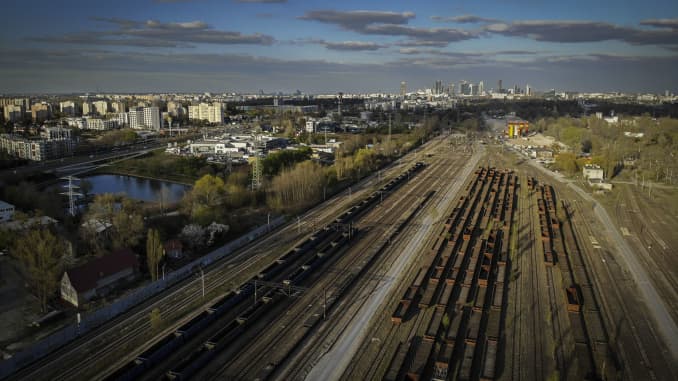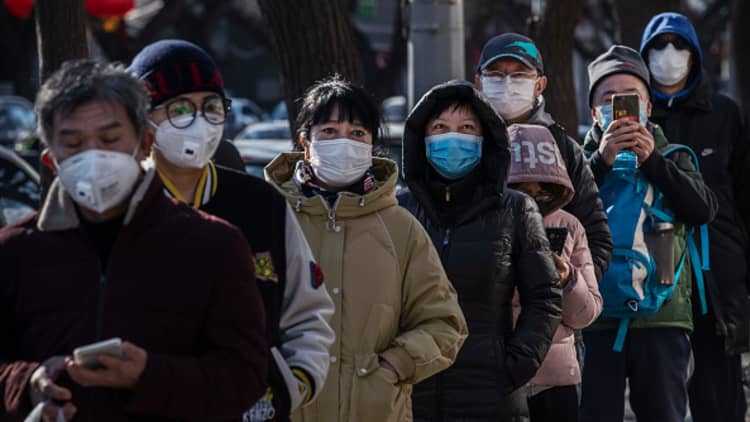- “Many countries under the (Belt and Road) initiative have borrowed heavily from China to invest in new projects, but the pandemic is disrupting economies and will complicate repayment plans,” said Kaho Yu, senior Asia analyst at Verisk Maplecroft.
- Yu told CNBC that currently, low-income countries under the BRI are already asking China for debt relief.
- China has had a track record of taking over assets when countries indebted to it go under.
- It will be “under pressure” to extend those loans or even write them off, analysts say.

China could find itself having to write off massive loans as countries that owe Beijing money under its massive infrastructure project struggle with mounting debts in the coronavirus fallout, analysts say.
China’s mammoth infrastructure investment plan — also known as the Belt and Road Initiative (BRI) — is highly controversial and widely criticized for saddling many countries with debt.
It is an ambitious project that aims to build a complex network of rail, road and sea routes stretching from China to Central Asia, Africa and Europe. It is also aimed at boosting trade. Chinese financial institutions have provided hundreds of billions in funding to countries involved in the BRI projects.
“Many countries under the BRI initiative have borrowed heavily from China to invest in new projects, but the pandemic is disrupting economies and will complicate repayment plans,” Kaho Yu, senior Asia analyst at Verisk Maplecroft, told CNBC.
The coronavirus pandemic has spread to more than 180 territories and countries in the world, and has infected more than 4.1 million people so far, according to data from Johns Hopkins University. At least 282,694 deaths related to Covid-19 have been reported since it first emerged late last year in China.
Several major BRI projects — such as those in Indonesia, Malaysia, Cambodia, Sri Lanka and Pakistan — have been stalled by lockdowns, according to Simon Leung, a banking and finance partner at law firm Baker McKenzie.
The outbreak has also led to disruptions in BRI projects which often depend heavily on labor and supplies — but both were prevented from reaching the sites as a result of the lockdowns, Leung pointed out.
“The drop in export revenues, coupled with increasing domestic spending as a result of the outbreak, have led to significant depreciation of local currency and in turn adversely affected the ability of borrowers to meet forex-denominated debts owing to Chinese banks,” said Leung, referring to increased spending in terms of stimulus packages. Less demand for a country’s goods typically also means less demand for its currency, causing it to weaken.
All that has affected the ability of debtor countries to repay their dollar-denominated loans from China.

More than 130 countries are under the BRI initiative, according to Beijing-based research firm Green Belt and Road Initiative Center. Many of those countries are in Europe, Africa, and Central Asia.
According to Yu, low-income countries under Belt and Road are already asking China for debt relief. That could come in the form of interest waivers, extension of payment periods or to suspend payments altogether in the medium term.
Pakistan and Sri Lanka could be among the worst-off, and may not be able to service their overall debt obligations this year as a result of the pandemic, analysts said.
Barter trade
Countries have also signed so-called “barter deals” with China, and they are “in an even more difficult position,” Yu said.
Some Chinese loans are reportedly denominated in barrels of oil — a practice the World Bank has flagged as opaque, because they mask the true payment amounts.
“Since the pandemic hit the oil prices, they will have to produce more oil to repay the loans. However, the pandemic has also disrupted all kinds of industrial activities, making it impossible for these countries to meet the required production level,” Yu said. “As a result, Chinese companies will likely be handed control over joint ventures or be repaid by assets.”
China has had a track record of taking over assets when countries cannot repay their loans. One high-profile example is Sri Lanka, which had to hand over a strategic port to Beijing in 2017, after it couldn’t pay off its debt to Chinese companies.
China’s loans to countries have been shrouded in secrecy, according to reports, with Beijing often demanding public-sector assets as collateral. Between 2000 and 2017, other countries’ debt owed to China soared ten-fold, according to a study last year.
‘Pressure’ to write off loans
China will be “under pressure” to extend those loans or even write them off, according to research firm Economist Intelligence Unit. It has already “indicated some willingness” to offer debt-relief programs to certain low-income countries, said EIU.
“There is, however, a growing likelihood that Chinese lenders will be forced into broader debt forgiveness, owing to force-majeure clauses or other arrangements,” the EIU said. A force majeure event occurs when unforeseeable circumstances — such as natural catastrophes or in this case, a pandemic — prevent one party from fulfilling its contractual duties, absolving them from penalties.
“Widespread debt write-offs could generate a negative feedback cycle that would discourage future Chinese lending activity over the remainder of 2020 (and into 2021),” the research firm said.
Much of the lending is done through two policy banks — the China Development Bank and Export-Import Bank of China, both of which are “closely linked” to the Chinese government, said Baker McKenzie’s Leung.
“Those banks enjoy government backing and support and therefore the debt renegotiations may involve political dialogue,” he said.

More importantly, China will be motivated to write off debts due to the BRI’s significance to China — and it will do so especially for projects that are “strategically important,” said Homin Lee, Asia macro strategist at Swiss private bank, Lombard Odier.
“Debt problems will be highly idiosyncratic, especially since China has strategic stakes in many of the transnational projects and also economic interest in ensuring the long-term success of the program,” he told CNBC in an email.
Back home, Chinese banks are already preparing for a growing pile of bad loans, as consumers and companies alike suffer the brunt of the pandemic. Earlier this year, China’s central bank said state lenders will have to tolerate higher levels of bad loans to support firms affected by the coronavirus.